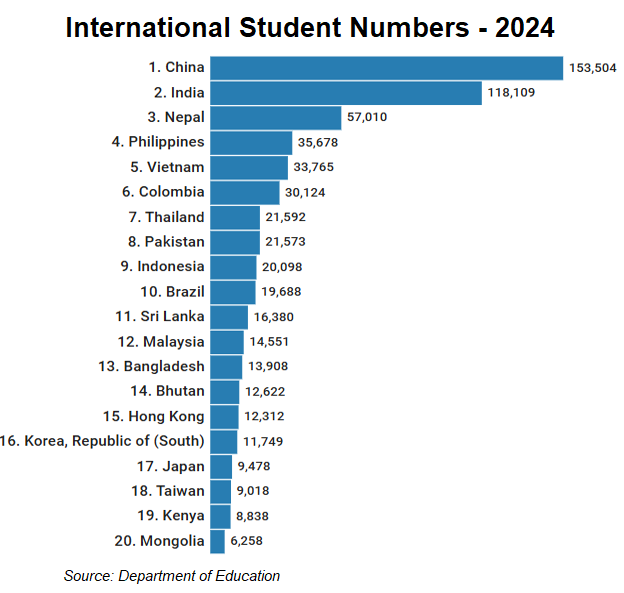The Guardian reported last month on the widespread cheating at our universities, which was primarily due to the surge in international students:

On Monday, Australia’s most international university, the University of Sydney, was embroiled in another cheating scandal involving hundreds of students:
Hundreds of Sydney University students were accused of cheating before teachers received a bomb threat warning them not to investigate in a disturbing escalation of cheating provider aggression…
The university recorded 940 contract cheating cases in 2023, up from 444 in 2022. In semester 1 this year, there were 237 cases of suspected contract cheating.
International students are overwhelmingly overrepresented in cheating cases, Sydney University’s misconduct report said.
In 2023, they accounted for 76.9% of reported breaches despite making up 51.6% of coursework enrolments – a significant increase since 2023 when they accounted for 70.94% of cases.
“Factors such as language barriers, cultural differences and unfamiliarity with academic conventions contribute to heightened vulnerability to academic misconduct among this demographic,” the report said.
The reality is that international student cheating has been a pervasive problem in Australia for at least a decade.
For example, in 2014, Fairfax implicated “functionally illiterate” Chinese students in a ghostwriting scandal.
In 2015, Four Corners released its “Degrees of Deception” report, which accused international students of widespread cheating and plagiarism.
The segment documented how Australia’s universities had engaged corrupt education agents who falsified the academic records of prospective international students to ensure their acceptance into the Australian tertiary system.
Four Corners also exposed the proliferation of soft-marking, mass-cheating, and the bribery of academics, which has contributed to a decline in pedagogical standards through the widespread acceptance of students with inadequate English proficiency.
In the same year, scores of international students in NSW were involved in a cheating ring, triggering a severe rebuke from the Independent Commission Against Corruption.
In 2018, an ABC investigation accused Australia’s universities of lowering English-language standards to attract international students, which resulted in some students being unable to learn or communicate effectively, encouraging cheating.
In 2019, concerns over widespread cheating on English language examinations prompted international student associations to call for stricter regulation of overseas agents.
Four Corners aired its “Cash Cows” report, which revealed widespread plagiarism and wrongdoing among international students.
Following the Four Corners exposé, local Murdoch University students reported that “some international students were trying to circumvent the language gap by plagiarising their assignments or contracting outside sources for help”.
Also in 2019, the AFR reported that “cheating has spread like wildfire” throughout Australia’s universities, driven by international students.
In 2020, the chief executive of the Tertiary Education Quality and Standards Agency (TESQA) vowed to tackle industrial-scale contract cheating, which was most prevalent among international students.
Shortly afterwards, Chinese students were embroiled in another cheating scandal, this time at the University of New South Wales.
In 2022, another ghostwriting scandal emerged centred around Asian students. This was followed later in the year with another report on the boom in contract cheating by international students.
Clearly, cheating by international students is a feature, not a bug, of Australia’s higher education system.
The core issue is that Australia’s higher education system has devolved into a commodity ‘volume-based’ business, with universities and private colleges lowering standards to sell as many places as possible to international students in order to maximise revenues.
Because of the lowered entry requirements, practically any overseas student can now study if they can afford the tuition.
As a result, the number of students from non-English-speaking countries such as China, India, and Nepal, has risen dramatically.

These students can only pass their written assignments if someone else completes them. As a result, academic standards have dropped, and the credibility of Australia’s higher education system has collapsed.
University administrators have also turned a blind eye to protect their cherished ‘cash cow’.
The solution is to treat the problem at its source by targeting a smaller intake of high quality students, including by:
- Raising entry standards (via stricter English-language proficiency and entrance exams);
- Raising financial requirements needed to enter Australia; and
- Removing the link between studying, work rights and permanent residency.
International education needs to transform into a genuine education industry rather than a people-importing immigration industry.
Students must come to Australia to study, not as a means of obtaining a backdoor work visa and permanent residency.

